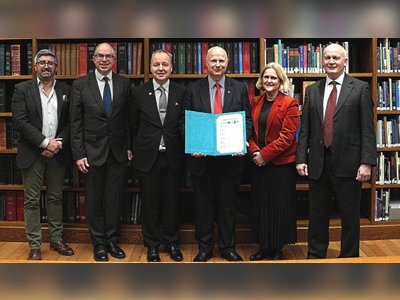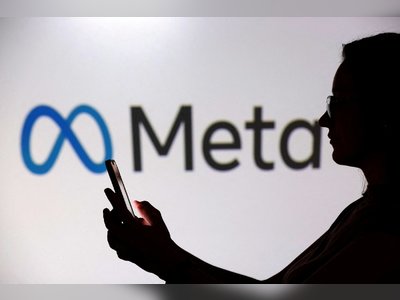0:00
0:00
Governments Prohibit DeepSeek AI Due to National Security Issues
Officials in Italy, Taiwan, Australia, South Korea, and the U.S. are taking measures against the Chinese chatbot DeepSeek due to concerns over data security risks.
The Chinese AI chatbot DeepSeek, known for its R1 program utilizing less advanced Nvidia semiconductors, is encountering bans from various governments due to concerns regarding the possible leak of sensitive information through generative AI services.
For instance, Italian authorities have initiated an investigation into DeepSeek and have restricted the app from accessing data of Italian users, following previous limitations imposed on similar platforms.
In Taiwan, public sector employees and those at critical infrastructure sites are barred from using the app, a decision that Australia quickly replicated.
South Korea's defense, unification, and police ministries have also prohibited DeepSeek on military and work computers, citing security concerns.
In the United States, lawmakers have proposed the "No DeepSeek on Government Devices Act," with Congressman Darin LaHood expressing that the app, linked to a company associated with the Chinese Communist Party, represents a troubling national security risk.
The apprehensions revolve around DeepSeek’s terms of service, which allow for sharing personal data with third parties, as well as its privacy policy, which indicates the collection of keystroke patterns to review user interactions.
Data security experts have pointed out that while U.S. companies typically resist government data demands, Chinese firms are legally obligated to supply user information if requested by the government.
In response, Beijing has claimed that it does not mandate enterprises or individuals to improperly collect or hold data, attributing the bans to the politicization of economic, trade, and technological matters.
Analysts also highlight DeepSeek’s commitment to core socialist values, as the company asserts that the same service rules apply both domestically and internationally.
DeepSeek was launched in May 2023 and has surfaced amid a marked increase in research and development investments in China, where R&D spending has reportedly surged over eleven-fold in the last decade according to data from the Korea Chamber of Commerce.
Experts, including academics from the University of Oslo and Sungkyunkwan University, suggest that the release of DeepSeek’s R1 program may have been a strategic decision made well before recent shifts in U.S. policy, reflecting an increased focus on software development.
They note that while semiconductor-exporting countries like South Korea and Taiwan thrive on advanced chips, DeepSeek’s dependence on the less-advanced H800 chips—allowed for sale to China until 2023 under U.S. export restrictions—shows that similar results can be achieved with standard semiconductors if the software is sufficiently effective.
This scenario has spurred calls for greater support and investment in software development from nations such as South Korea, as they strive to align with U.S. military cybersecurity standards in a period marked by intensified technological and geopolitical rivalry.
For instance, Italian authorities have initiated an investigation into DeepSeek and have restricted the app from accessing data of Italian users, following previous limitations imposed on similar platforms.
In Taiwan, public sector employees and those at critical infrastructure sites are barred from using the app, a decision that Australia quickly replicated.
South Korea's defense, unification, and police ministries have also prohibited DeepSeek on military and work computers, citing security concerns.
In the United States, lawmakers have proposed the "No DeepSeek on Government Devices Act," with Congressman Darin LaHood expressing that the app, linked to a company associated with the Chinese Communist Party, represents a troubling national security risk.
The apprehensions revolve around DeepSeek’s terms of service, which allow for sharing personal data with third parties, as well as its privacy policy, which indicates the collection of keystroke patterns to review user interactions.
Data security experts have pointed out that while U.S. companies typically resist government data demands, Chinese firms are legally obligated to supply user information if requested by the government.
In response, Beijing has claimed that it does not mandate enterprises or individuals to improperly collect or hold data, attributing the bans to the politicization of economic, trade, and technological matters.
Analysts also highlight DeepSeek’s commitment to core socialist values, as the company asserts that the same service rules apply both domestically and internationally.
DeepSeek was launched in May 2023 and has surfaced amid a marked increase in research and development investments in China, where R&D spending has reportedly surged over eleven-fold in the last decade according to data from the Korea Chamber of Commerce.
Experts, including academics from the University of Oslo and Sungkyunkwan University, suggest that the release of DeepSeek’s R1 program may have been a strategic decision made well before recent shifts in U.S. policy, reflecting an increased focus on software development.
They note that while semiconductor-exporting countries like South Korea and Taiwan thrive on advanced chips, DeepSeek’s dependence on the less-advanced H800 chips—allowed for sale to China until 2023 under U.S. export restrictions—shows that similar results can be achieved with standard semiconductors if the software is sufficiently effective.
This scenario has spurred calls for greater support and investment in software development from nations such as South Korea, as they strive to align with U.S. military cybersecurity standards in a period marked by intensified technological and geopolitical rivalry.











